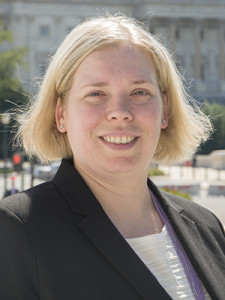
 By BJC Associate General Counsel Jennifer Hawks
By BJC Associate General Counsel Jennifer Hawks
There has been a lot of fear-mongering since last summer’s U.S. Supreme Court decision recognizing same-sex marriage as a constitutional right. One frequent rumor has been that LGBT advocates want to force pastors and churches to violate their theological positions and require them to participate in same-sex wedding ceremonies. That sort of conjecture is used to justify various legislation, including “pastor protection acts.” The truth is, pastors and churches have always enjoyed wide discretion, subject only to their own convictions and denomination polity, to participate (or not) in any wedding ceremony. Nothing about Obergefell v. Hodges changes this.
All this rhetoric about pastors and churches needing legal protection gives the impression that they will suddenly be turning down weddings for the first time and opening themselves up to lawsuits. Ask any pastor about weddings he or she has been asked to officiate. Odds are they have said no to at least one couple. It is not uncommon to hear of refusals for a number of reasons, such as church policy, a previous divorce, or a lack of maturity, compatibility or connection to the church.
Occasionally, pastors or churches refuse engaged couples for reasons that in other contexts would be illegal. In the summer of 2012, a predominantly white Mississippi Baptist church’s refusal to allow an African-American couple to get married in the church because of the couple’s race briefly captured national attention. While the refusal was denounced by church members as well as Baptist and non-Baptist Mississippians, no civil or criminal penalties followed.
If a racial refusal more than 50 years after the civil rights movement doesn’t trigger intervention by government authorities, it is hard to imagine what would. Frankly, the state has little interest in a church’s decision to solemnize (or not) any marriage. Nothing in the current legal landscape indicates that pastors or houses of worship will someday be required to officiate or host any wedding, much less one that doesn’t conform to their religious doctrine. To allay the fear that Obergefell somehow changed this, several states have passed or are considering legislation often referred to as “pastor protection acts.”
While not legally necessary, “pastor protection acts” are not controversial when they pursue their most obvious objective: to reassure pastors and churches that they are not required to solemnize any and all marriages on demand. Such legislation, however, becomes controversial when expanded beyond the church in ways that conflict with the public’s understanding of fairness in the civil arena.
The first statute to address this issue was Connecticut’s legislative recognition of same-sex marriage in 2009. It provided that “No member of the clergy authorized to join persons in marriage … shall be required to solemnize any marriage …” and “[n]o church or qualified church-controlled organization … shall be required to participate in a ceremony solemnizing a marriage … .” In fact, every state that legislatively opened up civil marriage to same-sex couples included some form of explicit recognition that pastors can refuse to perform any ceremony as an expression of their free exercise of religion.
Post-Obergefell, several states that had previously banned same-sex marriage are now looking to pass stand-alone “pastor protection acts.” Some of these independent proposals follow what other states had previously done and provide explicit reassurances to houses of worship and clergy that they are not required to solemnize any particular marriage.
Some states, though, have pushed the boundaries, fueling further conflict. For example, the first version of Texas’ “pastor protection act” provided that religious organizations and certain individuals and entities associated with them could refuse to participate in the “solemnization, formation, or celebration of any marriage, or treat any marriage as valid for any reason.” Controversy erupted over this final phrase. The potential reach of permitting any religious organization the ability to deny the validity of any marriage for any purpose went far beyond ensuring that pastors or churches would not be required to solemnize a marriage they found theologically objectionable. Fortunately, this controversial provision was eventually deleted from the bill, allowing it to be enacted with little fanfare and no calls for boycotts.
When carefully crafted, “pastor protection acts” non-controversially provide explicit reassurances that clergy and houses of worship can make theological decisions when it comes to wedding participation. This clarification can strengthen the public’s understanding of important boundaries between church and state. If, however, the slogan of “pastor protection” is used as cover to exempt a wide range of entities from various interactions with the LGBT community, pastors and their supporters should ask if the legislation’s goal is to protect pastors or condemn their LGBT neighbors.
From the May 2016 edition of Report from the Capital. Click here to view the issue as a PDF document.




